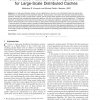Free Online Productivity Tools
i2Speak
i2Symbol
i2OCR
iTex2Img
iWeb2Print
iWeb2Shot
i2Type
iPdf2Split
iPdf2Merge
i2Bopomofo
i2Arabic
i2Style
i2Image
i2PDF
iLatex2Rtf
Sci2ools
136
click to vote
TKDE
2002
2002
Coordinated Placement and Replacement for Large-Scale Distributed Caches
In a large-scale information system such as a digital library or the web, a set of distributed caches can improve their effectiveness by coordinating their data placement decisions. Using simulation, we examine three practical cooperative placement algorithms, including one that is provably close to optimal, and we compare these algorithms to the optimal placement algorithm and several cooperative and noncooperative replacement algorithms. We draw five conclusions from these experiments: 1) Cooperative placement can significantly improve performance compared to local replacement algorithms, particularly when the size of individual caches is limited compared to the universe of objects; 2) although the amortizing placement algorithm is only guaranteed to be within 14 times the optimal, in practice it seems to provide an excellent approximation of the optimal; 3) in a cooperative caching scenario, the recent greedy-dual local replacement algorithm performs much better than the other local...
Related Content
| Added | 23 Dec 2010 |
| Updated | 23 Dec 2010 |
| Type | Journal |
| Year | 2002 |
| Where | TKDE |
| Authors | Madhukar R. Korupolu, Michael Dahlin |
Comments (0)

